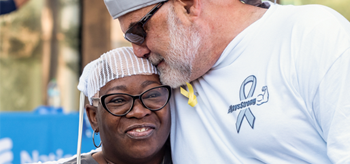In 2021, the World Health Organization (WHO) updated its classification of Tumor Types of the Central Nervous System. The WHO sponsors a group of pathologists and clinicians who are experts in brain and spinal cord tumors to develop the criteria for how brain tumors are classified and graded. As the scientific field continues to better understand the biology of brain tumors, a separate organization, cIMPACT (the Consortium to Inform Molecular and Practical Approaches to CNS Tumor Taxonomy), periodically reviews and updates new recommendations that guide the WHO’s brain tumor classifications.
These periodic updates make brain tumor classifications more accurate. NBTS published a blog post with more information on what patients need to know about these latest updates. The main takeaway is that, more so than ever before, patients need to understand the molecular makeup of their tumor, which is often accomplished through biomarker testing at the patient’s diagnosis hospital. If their medical center does not have the technology to perform biomarker testing, the patient may consider seeing a brain tumor specialist at a large academic medical center or an NCI-Designated Cancer Center.
Several companies also perform biomarker testing, enabling a patient’s tumor sample to be sent in for analysis.
The results of biomarker testing can provide information about diagnosis, prognosis, and treatment plans.
Biomarkers and Clinical Trials
In “precision medicine,” patients’ biomarkers are used to assign patients to the arm of the trial with the matching therapy that is expected, as seen in other cancers, to be effective for the subset of patients with that biomarker. New clinical trial designs, such as “basket,” “platform,” and “umbrella” trials, incorporate biomarkers of a tumor to help identify which patients may be a good fit for the experimental treatment or which experimental treatment is best for the patients.
Biomarker Testing Key Questions
- How can I get a sample of my tumor tested for biomarkers to learn if any targeted therapies might treat my tumor type?
- Which biomarkers should be tested for my tumor type? Can you explain how they might affect my response to therapy and treatment?
- Is there enough tumor tissue for biomarker testing?
- Does insurance cover the costs for biomarker testing? If not, is there financial assistance available?
- How long does it take to get biomarker testing results back?
- Are there targeted therapy drugs, immunotherapies, or other treatments based on the results of my biomarker tests? If yes, what is this drug or treatment called, and do you recommend it?
- How can I enroll in a clinical trial?
What is genetic counseling?
What is a genetic counselor?
A genetic counselor is a medical professional who gives you information about how genetic conditions might affect you or your family. A genetic counselor helps you understand genetic testing. They’ll help you decide if it is right for you, the best types of tests, and how to interpret and cope with the results.
If I have or had a brain tumor, should my family and I see a genetic counselor?
A genetic counselor will ask you about your personal and medical family history and review your medical records. A genetic counselor then discusses genetic testing options with you. These include:
- Diagnostic testing to confirm rare tumor type and possible tumor subtypes.
- Predictive or pre-symptomatic genetic testing to determine when certain types of cancer run in a family and a gene mutation is suspected.
- Carrier screening to determine if an individual is a carrier for certain genetic diseases.
More Resources
Brain Tumor Glossary
Clinical Trial Finder
Symptom Tracker
Medication & Supplement Tracker
Additional Resources for Patients and Caregivers


